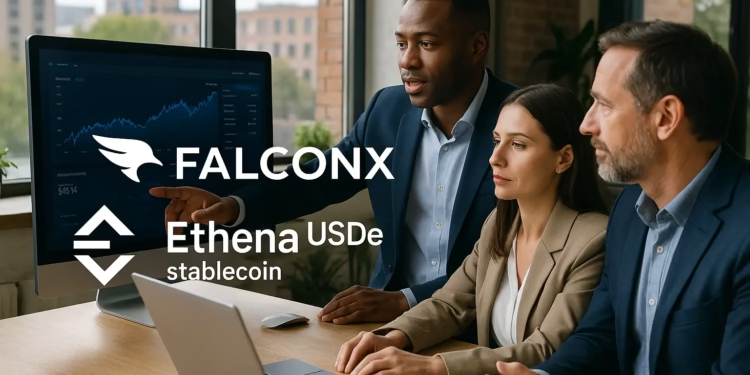FalconX, a U.S.-based digital asset prime brokerage, has added support for the Ethena USDe stablecoin, opening up a new range of opportunities for its institutional clients. The firm announced on Thursday that the integration will allow approved users to trade, custody, and deploy USDe across its platform.
The Ethena USDe stablecoin can now be used as collateral for derivatives positions and credit extensions on FalconX. Clients will also have access to spot markets, over-the-counter liquidity, and custody services tailored to the stablecoin.
“Stablecoins have become a core part of institutional strategies, and integrating USDe gives our clients additional flexibility in portfolio management,” said Raghu Yarlagadda, CEO of FalconX, in a statement.
The announcement highlights the growing adoption of the Ethena USDe stablecoin, which has rapidly established itself as one of the most prominent assets in the digital currency market.
Ethena USDe stablecoin grows market share
The Ethena USDe stablecoin has become the third-largest stablecoin by supply in less than a year, trailing only USDT and USDC. Its rapid expansion is tied to integrations across a variety of decentralized finance (DeFi) and centralized platforms.
In May, the Hyperliquid ecosystem announced support for USDe on HyperCore, HyperEVM, and Unit. This allowed users to trade directly with USDe, borrow against it through lending protocols such as Euler and Felix, and participate in yield-generating strategies.
“USDe has moved beyond being just another stablecoin—it’s becoming a versatile financial instrument,” said Clara Medici, Senior Analyst at Chainalysis. “Its adoption across DeFi ecosystems suggests institutions are taking notice.”
The token’s yield-bearing counterpart, known as sUSDe or tsUSDe on-chain, has also found traction. By offering returns through structured strategies, sUSDe provides an alternative to traditional dollar-pegged stablecoins that typically lack yield.
Expansion into consumer ecosystems
Another factor behind the Ethena USDe stablecoin’s momentum is its integration into consumer-facing platforms. In recent months, USDe and its staked version were launched on the Telegram Open Network (TON). This rollout enabled users to access the assets via Telegram’s built-in wallet as well as third-party options like Tonkeeper and Tonhub.
The move effectively brought the Ethena USDe stablecoin to millions of Telegram’s global users, enabling simple access to dollar-pegged assets inside one of the world’s most widely used messaging apps. Analysts say this could accelerate mainstream adoption.
“Bringing stablecoins into everyday apps like Telegram is a critical step,” said Alex Gladstein, Chief Strategy Officer at the Human Rights Foundation. “For users in emerging markets, it means stable value and yield opportunities are just a few taps away.”
Beyond Telegram, Ethena partnered with the cross-chain protocol LI.FI to enhance interoperability. This integration allows stablecoins from more than a dozen blockchains—including USDT and USDC—to be converted seamlessly into USDe or its governance token, ENA, through Ethena’s interface.
Implications for institutional investors
For FalconX clients, the arrival of the Ethena USDe stablecoin could strengthen liquidity and trading efficiency in crypto markets. By supporting USDe as collateral, the brokerage enables hedge funds, asset managers, and proprietary trading firms to unlock leverage and structure complex strategies with greater flexibility.
FalconX’s integration also highlights how institutional adoption often lags retail innovation but eventually accelerates once a stablecoin demonstrates sufficient liquidity and demand. As USDe continues to grow in supply and integrations, institutional players may increasingly view it as an alternative to USDT and USDC.
Still, some analysts caution that the Ethena USDe stablecoin carries unique risks tied to its synthetic design, which differs from traditional fiat-backed models. Market participants will be watching how USDe holds its peg during volatile conditions.
“The design of USDe has advantages in yield and flexibility, but stress testing in turbulent markets will be crucial,” said Matthew Sigel, Head of Digital Assets Research at VanEck.
Outlook
The FalconX announcement underscores the accelerating institutionalization of stablecoins and the rapid rise of the Ethena USDe stablecoin in particular. With its presence now spanning DeFi platforms, consumer apps, and major brokerages, USDe is positioning itself as a serious contender in the global stablecoin race.
For crypto investors, the key question is whether USDe’s synthetic model can maintain resilience over the long term. If it does, the Ethena USDe stablecoin may carve out a significant role in both retail adoption and institutional trading strategies.











